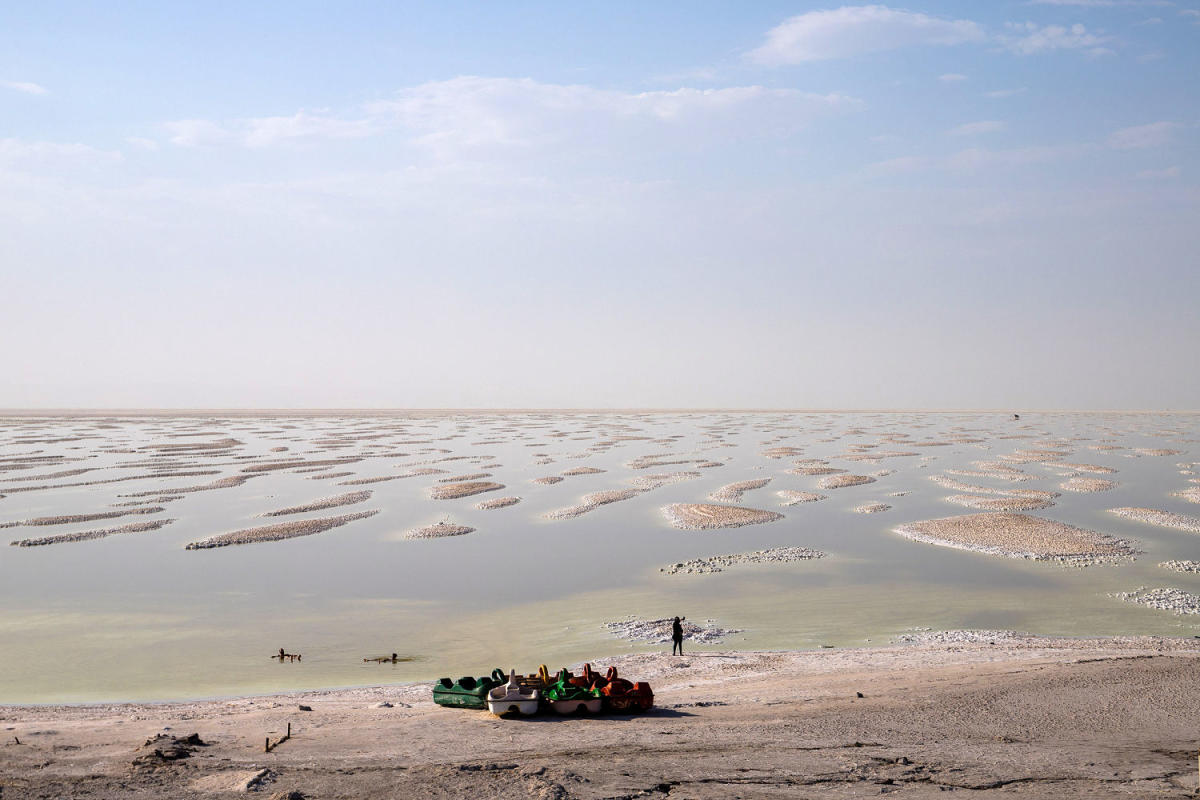The drought conditions that have roiled Syria, Iraq and Iran over the past three years would not have happened without climate change, a new analysis suggests.
Scientists with the World Weather Attribution group analyzed three years of temperature and precipitation data and found that climate change contributed to extreme temperatures, which in turn made drought at least at least 25 times more likely in parts of Syria and Iraq, and over 16 times more likely in Iran.
The study shows how climate change is playing a role in one of the world’s worst humanitarian disasters, combining with political chaos and conflict to push people into hunger and forcing many to flee their homes.
An aerial of stranded fishing boats on the banks of the Euphrates river in low water levels (Delil Souleiman / AFP via Getty Images)
“Human-caused global climate change is already making life considerably harder for tens of millions of people in West Asia,” said Mohammad Rahimi, a professor of climatology at Semnan University in Iran, during a news conference Tuesday, warning that the continued use of fossil fuels would make these landscapes “harsher.”
In a region where some areas have been destabilized by war, crumbling infrastructure and urbanization, climate change has “acted as a threat multiplier,” said Rana El Hajj of Red Cross Red Crescent Climate Center, who said the region has seen widespread desertification and deforestation in recent years.
More than 12 million people have been forced to leave their homes in Syria since 2011, according to MedGlobal estimates. Nearly 2 million people living in rural areas have been displaced by drought, the estimates suggest.
A boy holds up the dried-up skull of a water buffalo in a parched area of the Chibayish marshes (Asaad Niazi / AFP via Getty Images)
In 2022, about 12 million people — 60% of the country’s population – faced hunger, according to the International Rescue Committee. Drought hampered Syria’s ability to grow and harvest wheat. In 2021, the nation produced just a quarter of the wheat it grew before the ongoing civil war began.
The group of WWA scientists evaluated three years of temperature and moisture data in Syria, Iraq and Iran between July 2020 and July 2023, when the countries were experiencing extreme drought.
The region experienced low rainfall, but the researchers found that persistent heat was the primary driver of the drought due to evaporation and transpiration from plants.
Their models showed that, if the world were 1.2 degrees C cooler, as it was before industrial times, there would not be a drought and conditions would be normal.
An aerial view of Mesopotamian Marshes as the area dries up due to increasing temperatures and lack of rainfall in Nasiriyah (Haidar Mohammed Ali / Anadolu Agency via Getty Images)
Because of global warming, droughts as extreme as this one can be expected once a decade in Iraq and Syria and twice a decade in Iran, the study found.
“This is already touching the limits of what some people are able to adapt to. As long as we keep burning fossil fuels or give out new licenses to explore new oil or gas fields, these events will only get worse,” said Friederike Otto, a climate scientist with the Grantham Institute at the Imperial College in London.
The World Weather Attribution group is a loose consortium of climate scientists who study extreme weather and publish rapid findings about climate change’s role in major events. Their research methods are published and peer-reviewed, but this specific analysis has not been subjected to a typical academic review process. The group’s previous findings have held up to outside scrutiny after initial publication.
This article was originally published on NBCNews.com
Traducido por APA-navigator
